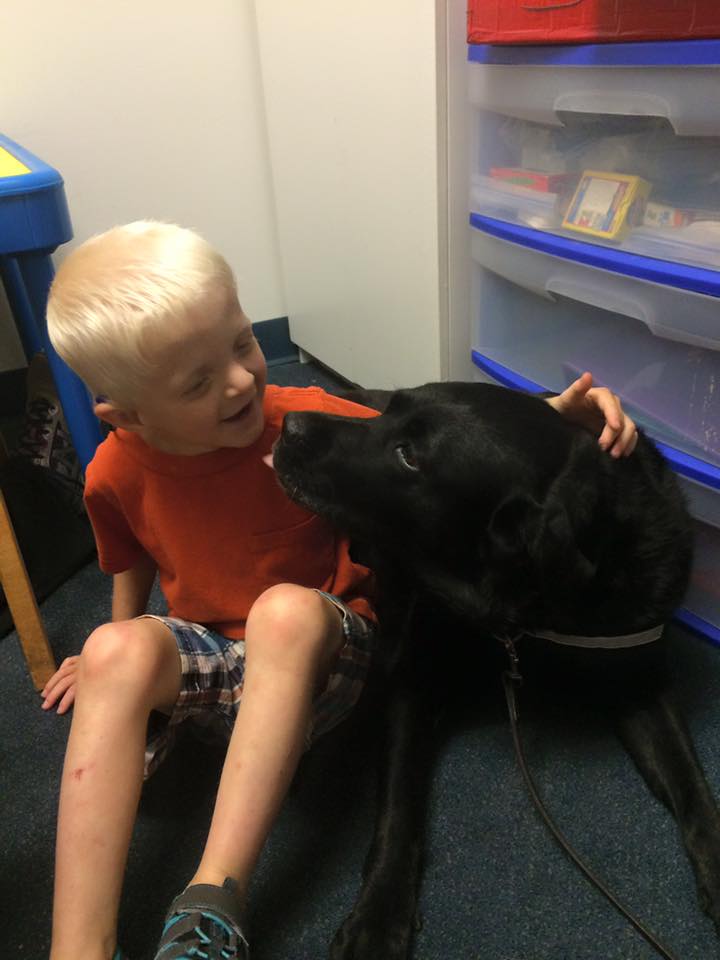

NIS first implemented its Animal-Assisted Therapy program, named Pet Pals, in the Fall of 2015 as an innovative support offered to children in conjunction with speech, occupational, or physical therapy. Students are recommended for this program based upon their individual profiles and teacher or therapist recommendations. The program is contingent upon parental approval and the student’s comfort in the presence of dogs.
Animal Assisted Therapy (AAT) is a goal-directed intervention in which an animal participates in the treatment of an individual, typically as a reinforcer or motivator for the individual’s progress. Research documenting the efficacy of AAT is in its early stages, though AAT and related use of animals in intervention has become prevalent for a variety of settings and populations (Bone, 2013; Budahn, 2013; Busch et al., 2016; Friesen, 2010; Gee, Crist, & Carr, 2010). These include hospitals, senior living centers, trauma survivors, and persons with developmental disabilities. Animals have been purported to increase motivation, break down barriers to building relationships, and provide emotional support.
Since the inception of our program, we have been committed to exploring and documenting the possible impacts of specially-trained working dogs during a variety of therapy sessions for NIS students. Preliminary data collection at the inception of the Pet Pals program (in 2015) proved promising, and we have since refined our research methods and focus. An official pilot study with IRB (Independent Review Board) approval was initiated in the Spring of 2018 with students who were already part of the Pet Pals occupational therapy program. The purpose of this study was to evaluate the potential impact that the presence of a dog may have on the attention and focus of students engaged in table-based occupational therapy activities. Data collected from the pilot study showed significant difference in attending to tasks when the dog was present in the room with the student versus traditional occupational therapy. In the Summer of 2018, the second phase commenced with a smaller subset of the original students from the first phase. In this second phase, the goal was to look at the impact that the dogs have when directly incorporated into the table-based occupational therapy activity.
Given the promising results from our studies thus far, we have further defined our research methods and focus. The current phase of the research project spans the Fall 2018-Spring 2019 academic year. The new cohort of students have had no prior participation in the Pet Pals program, which allows us to better understand the effects of AAT on a novel sample. We are assessing the extent to which the presence of and interaction with a dog in occupational therapy sessions can increase students’ attention and focus on table-based activities, and how it can further impact the level of therapeutic support required in this context.
NIS is excited to share the first publication on this research!
2022- empirical study in a peer-reviewed journal
Winsor, K., Silverstein, J., Theodore, L. A., Naik, A., & Shyman, E. (2022). Assessing the Impact of Animal-Assisted Occupational Therapy on Attention in Preschoolers. Human-Animal Interaction Bulletin, (2022).
2023- chapter in a book
Winsor, K. (2023). Establishing an Animal-assisted Therapy Program at a Preschool. In Animal-assisted Interventions: Recognizing and Mitigating Potential Welfare Challenges (pp. 100-103). GB: CABI.
2024- case study in a peer-reviewed journal
Winsor, K. (in press). Developing a Formal Animal-Assisted Therapy Program Across Disciplines at a Preschool with Welfare Considerations for Canine Participants. Animal Behaviour & Welfare Cases.
